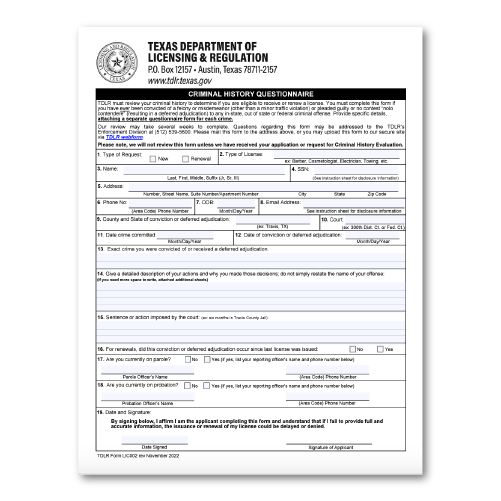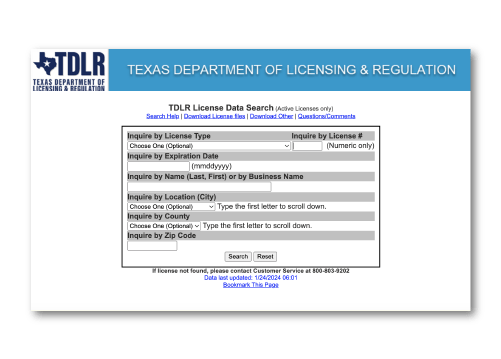
The Texas electrical industry is a major contributor to the state's economy, employing over 936,000 workers and accounting for 11.5% of all U.S. energy jobs. As such, it offers numerous opportunities for individuals and companies looking to expand their business ventures in Texas.
However, as with any profession, obtaining and renewing a Texas electrical license is crucial in ensuring compliance with state regulations and maintaining a successful career. Even more, Texas offers various electrical licenses, each with its own requirements and benefits.
While most companies hire licensed electricians, some also choose to train and certify their own employees. Whichever path you choose, it's essential to understand the process of obtaining and renewing a Texas electrical license.
Types of Electrical Licenses in Texas
The Texas Department of Licensing and Regulation (TDLR) oversees the licensing process and ensures that all individuals and companies performing electrical work in Texas meet state standards. Electrical work is defined as any task involving installation, maintenance or extension of electrical wires, apparatus or equipment to a building or residence.
Here are six steps to consider when learning how to become an electrician in Texas:
1. Electrical apprentice license
An electrical apprentice license allows you to work under the direction and supervision of a journeyman, residential wireman or master electrician. This license type is ideal for those seeking practical experience and training while working towards a higher-level electrical license.
The eligibility requirements for an electrical apprentice license are:
- You must be physically capable of performing electrical work.
- You’ll work under the direction of a supervisor.
- You’re at least 16 years old.
Where the applicant has a criminal record, the TDLR conducts background checks on individuals applying for or renewing an electrical license. A criminal conviction does not necessarily disqualify you from obtaining a license; however, the crime's type and nature are considered during the review process.
You must submit a completed criminal history questionnaire and your application materials. If you’re concerned about your criminal history, you may request TDLR to review it before submitting an official application. More information on this process can be found here.
Fees: $20 for application.

2. Residential wireman license
A residential wireman license qualifies you to install, maintain and repair electrical wiring in single-family or multi-family residences no higher than four stories. With this license, you can work as an independent contractor or an employee of a licensed electrical company.
While the TDLR has exceptions if you’re a homeowner or farmer working on your own property, anyone performing electrical work in Texas must be licensed.
The TDLR does advise you check the license status of any person performing electrical work for you. A TDLR-licensed electrician should also provide evidence that they are licensed or registered.

The eligibility requirements for a residential wireman license are:
- 4,000 hours of on-the-job training under the supervision of a master electrician or residential wireman licensed in Texas.
- A completed experience verification form signed by each supervisor.
- You’re physically capable of performing electrical work.
- You’re at least 18 years old.
Fees: $20 for application, licenses are valid for one year from the date of issuance and must be renewed annually.
3. Journeyman electrician license
Once you have obtained a residential wireman license and completed 4,000 hours of on-the-job training, you may apply for a Texas journeyman electrician license.
A journeyman electrician license allows you to perform electrical work under the supervision of a master electrician. This means that they must oversee and direct your work.
There are four types of Journeyman licenses available in Texas:
- Journeyman sign electrician - allows you to perform electrical sign work under the supervision of a master sign electrician or master electrician.
- Journeyman industrial electrician - allows you to perform electrical work exclusively at businesses that operate chemical plants, petrochemical plants, natural gas plants, natural gas treating plants, refineries, pipelines, or oil and gas exploration and production operations. Industrial electricians do not work on residential or commercial projects.
- Maintenance electrician - allows you to perform electrical maintenance work under the supervision of a master electrician.
- Journeyman lineman - allows you to perform electrical work involving the operation and maintenance of equipment to transmit and distribute electricity from a source to a substation.
The eligibility requirements for a journeyman electrician license are:
- Completed at least 7,000 hours of on-the-job training under the supervision of a master electrician licensed in Texas. This allows individuals to take the journeyman electrician exam before completing the 8,000 hours required.
- A submitted experience verification form signed by each supervisor.
- You’re physically capable of performing electrical work.
- You’re at least 18 years old.
Fees: $30 for application, the license is valid for one year and must be renewed annually.
4. Master electrician license
A master electrician license allows you to install, maintain or extend an electrical wiring system. This includes the apparatus or equipment used in connection with electrical energy in, on, outside or attached to a building. In shorter terms - you’re authorized to perform any type of electrical work.
To qualify for a master electrician license, you must have held a valid journeyman electrician license or equivalent license from another state for at least two years. However, journeyman industrial electrician experience may not be used to qualify for a master electrician license.
The eligibility requirements for a master electrician license are:
- Completed at least 12,000 hours of on-the-job training under the supervision of a master electrician licensed in Texas. Each supervisor must document and verify using an experience verification form.
- Completed master electrician license application form with the necessary documentation and fees submitted.
- You’re physically capable of performing electrical work.
- You’re at least 18 years old.
Fees: $45 for application, the license is valid for one year and must be renewed annually.
5. Maintenance electrician license
A maintenance electrician license allows you to perform electrical maintenance work under the supervision of a master electrician. Under a recurring revenue model, some electricians create maintenance packages that offer inspection and service on a monthly, quarterly, or annual basis. Others bundle their services together to offer at a discounted rate.
The eligibility requirements for this type of license are:
- Completed 8,000 hours of on-the-job training under the supervision of a master electrician or maintenance electrician licensed in Texas. This experience must be documented and verified by each supervisor using an experience verification form.
- Completed maintenance electrician license application form submitted with the necessary documentation and fees.
- You’re physically capable of performing electrical work.
- You’re at least 18 years old.
Fees: The non-refundable application fee for a Maintenance Electrician license is $20. Once issued, the license is valid for one year and must be renewed annually.
6. Electrical contractor license
In Texas, you must hold a valid electrical contractor license to design, install, repair or alter electrical wires or conductors for light, heat, power or signaling purposes. This includes installing and repairing ducts, raceways, conduits for wire protection and any other electrical machinery or system.
While a master electrician can perform any type of electrical work, they must be present and oversee the work performed by those under their supervision. An electrical contractor license allows you to take on this type of business without being physically present at every job site.

To become an electrical contractor in Texas, you need the following:
Liability Insurance Coverage:
Texas requires electrical contractors to maintain a minimum liability insurance coverage of:
- $300,000 per occurrence (combined with property damage and bodily injury);
- $600,000 aggregate (the total amount the policy will pay for property damage and bodily injury coverage) and
- $300,000 aggregate for products and completed operations.
This insurance protects electrical contractors against claims of bodily injury or property damage caused by their work.
To provide proof of liability insurance coverage, applicants must use the electrical contractor certificate of insurance form and include it with their completed application materials.
Workers' Compensation Insurance:
In addition to liability insurance, electrical contractors must provide proof of workers' compensation insurance. This can be done in one of the following ways:
- Providing proof of having obtained workers' compensation insurance;
- Submitting a certificate of authority to self-insure or
- Submitting a statement indicating that you have elected not to obtain workers' compensation insurance, along with a completed employer notice of no coverage or termination of coverage form.
Fees: In addition to insurance, applicants must submit a completed electrical contractor or electrical sign contractor license application and the non-refundable $110 application fee.
Looking to grow your electrical business?
Check out this article to learn more about marketing for electricians
Looking to grow your electrical business?
Check out this article to learn more about marketing for electricians
Read MoreThe Process of Getting an Electrical License in Texas
Start as an electrical apprentice
An electrical apprentice license is the first step towards obtaining a Texas electrical license. This license allows you to work as an apprentice under the supervision of a licensed master electrician or journeyman electrician.
There is no education or experience required to obtain an electrical apprentice license in Texas. However, you must be at least 16 years old and have a high school diploma or equivalent.
Accumulate required hours of on-the-job training
After obtaining an electrical apprentice license, you must work a certain number of hours of on-the-job training under the supervision of a licensed master electrician or journeyman electrician. The required number of hours varies depending on the type of license being purchased.
- Residential wireman: 4,000 hours
- Journeyman electrician: 8,000 hours (if completed as an apprentice)
- Master electrician: 12,000 hours (if completed as an apprentice)
Complete any required educational courses and exams
Along with on-the-job training, certain types of Texas electrical licenses require you to complete educational courses and exams. For example:
- Journeyman electrician license: complete a 4-year apprenticeship program and pass the journeyman electrician exam.
- Master electrician license: complete a 12,000-hour apprenticeship or equivalent experience and pass the master electrician exam.
Submit application with documentation and fees
Once all requirements have been met, you can submit your completed application, documentation, and fees to the TDLR via mail or online.
Required documentation may include proof of liability, workers' compensation insurance, educational transcripts, and verification of on-the-job training hours.
Obtain insurance or bonding
Insurance and bonding are required for specific electrical certification Texas. For instance, master electricians and electrical contractors require liability insurance, while residential wiremen and journeyman electricians may need to obtain a surety bond. These requirements help protect both the license holder and their customers.
Once all insurance or bonding requirements have been met, you’ll receive your Texas electrical license in the mail within 4-6 weeks.
Texas Electrical License Renewal Process
Complete continuing education
To maintain a Texas electrical license, individuals must complete continuing education courses annually. The number of hours required varies depending on the type of license held:
- For apprentices, 4 hours of continuing education are required each renewal cycle. However, apprentices may enroll in a department-registered electrical apprenticeship training course instead of completing continuing education courses.
- For journeymen, maintenance electricians, residential wireman, and master electricians, 4 hours of continuing education are required each year. This can be completed through any TDLR-approved provider.
Check for any changes in state requirements
While the basic requirements for obtaining and renewing a Texas electrical license remain consistent, it is essential to check with TDLR each year for any state law and regulation changes. This may include insurance or bonding requirements, changes in continuing education hours or new licensing exams.
Gather necessary documents
When renewing your Texas electrical license, you must gather any necessary documentation and fees before submitting your renewal application. This may include proof of completed continuing education courses, updated insurance or bonding information and the $110 application fee.
Submit renewal application and fees
Last but not least, you can then submit your completed renewal application and fees to TDLR via mail or online. Upon approval, the department will process the application and send out a new Texas electrical license.
Illuminating Your Electrical Career Path in Texas
Expanding your electrical business to Texas can open up new opportunities for growth and reccurring revenue. By understanding the process of obtaining and renewing a Texas electrical license, you can ensure that your business complies with state laws and regulations while providing quality services to your customers.
If you’re looking for more inside information on the trades industry, look no further than our Voice of the Trades report. Remember, staying informed and educated is vital to success in the electrical industry. So, keep exploring and expanding your knowledge.